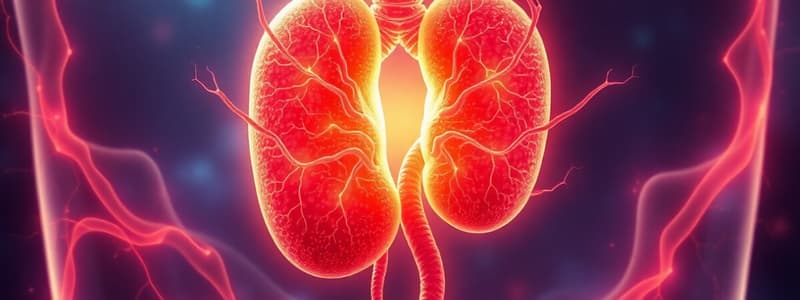Podcast
Questions and Answers
Which hormone is classified as a glucocorticoid produced by the adrenal gland?
Which hormone is classified as a glucocorticoid produced by the adrenal gland?
- Epinephrine
- Norepinephrine
- Cortisol (correct)
- Dopamine
What is one of the primary functions of the adrenal cortex?
What is one of the primary functions of the adrenal cortex?
- Secreting dopamine
- Producing adrenaline
- Regulating salt and water balance (correct)
- Releasing norepinephrine
Which part of the adrenal gland is responsible for producing catecholamines?
Which part of the adrenal gland is responsible for producing catecholamines?
- Adrenal medulla (correct)
- Collecting duct
- Adrenal cortex
- Kidney cortex
What is a common consequence of adrenal gland disorders?
What is a common consequence of adrenal gland disorders?
What is the approximate weight of a normal adrenal gland?
What is the approximate weight of a normal adrenal gland?
What is the primary role of cortisol in the body?
What is the primary role of cortisol in the body?
How does the adrenal cortex respond to stressful situations?
How does the adrenal cortex respond to stressful situations?
What minimum amount of cortisol is usually provided by the body for non-stressed adults?
What minimum amount of cortisol is usually provided by the body for non-stressed adults?
Which hormone is released by the anterior pituitary gland in response to stress?
Which hormone is released by the anterior pituitary gland in response to stress?
What effect do adrenocortical steroids have on the body?
What effect do adrenocortical steroids have on the body?
What initiates the secretion of corticotrophin-releasing hormone (CRH) in response to stress?
What initiates the secretion of corticotrophin-releasing hormone (CRH) in response to stress?
Which hormone is primarily responsible for stimulating cortisol secretion from the adrenal cortex?
Which hormone is primarily responsible for stimulating cortisol secretion from the adrenal cortex?
How does high plasma cortisol level affect ACTH release?
How does high plasma cortisol level affect ACTH release?
When do plasma ACTH levels typically begin to rise in the sleep cycle?
When do plasma ACTH levels typically begin to rise in the sleep cycle?
What is the primary function of glucocorticosteroids in the body?
What is the primary function of glucocorticosteroids in the body?
What is a common cause of primary adrenocortical insufficiency in Addison’s disease?
What is a common cause of primary adrenocortical insufficiency in Addison’s disease?
Which of the following is NOT a complication of Cushing’s syndrome?
Which of the following is NOT a complication of Cushing’s syndrome?
What is the primary treatment for Cushing’s syndrome?
What is the primary treatment for Cushing’s syndrome?
What condition is characterized by symptoms such as hypotension, hyperkalemia, and loss of consciousness?
What condition is characterized by symptoms such as hypotension, hyperkalemia, and loss of consciousness?
What is the likely outcome when 90% of the adrenal cortex is destroyed?
What is the likely outcome when 90% of the adrenal cortex is destroyed?
Which of the following conditions can arise from hypercortisolism?
Which of the following conditions can arise from hypercortisolism?
What physiological issue occurs due to renal and adrenal surgery?
What physiological issue occurs due to renal and adrenal surgery?
Which symptom is NOT associated with chronic cortisol deficiency in Addison’s disease?
Which symptom is NOT associated with chronic cortisol deficiency in Addison’s disease?
What is the most common factor predisposing patients to acute adrenal insufficiency in a dental setting?
What is the most common factor predisposing patients to acute adrenal insufficiency in a dental setting?
How much hydrocortisone should be administered to patients with chronic adrenal insufficiency every 6 to 8 hours?
How much hydrocortisone should be administered to patients with chronic adrenal insufficiency every 6 to 8 hours?
Which mechanism is NOT a cause of glucocorticosteroid deficiency leading to adrenal insufficiency?
Which mechanism is NOT a cause of glucocorticosteroid deficiency leading to adrenal insufficiency?
What should be done first when signs of adrenal insufficiency appear during dental treatment?
What should be done first when signs of adrenal insufficiency appear during dental treatment?
Why is secondary adrenocortical insufficiency considered a greater potential threat than primary adrenal insufficiency?
Why is secondary adrenocortical insufficiency considered a greater potential threat than primary adrenal insufficiency?
What is the expected time frame for the adrenal cortex to return to normal after cessation of corticosteroid therapy?
What is the expected time frame for the adrenal cortex to return to normal after cessation of corticosteroid therapy?
What is a common treatment for adrenal insufficiency in conscious patients during a dental emergency?
What is a common treatment for adrenal insufficiency in conscious patients during a dental emergency?
Which of the following symptoms may indicate a patient is experiencing adrenal insufficiency?
Which of the following symptoms may indicate a patient is experiencing adrenal insufficiency?
How should dexamethasone be administered while waiting for the results of the ACTH stimulation test?
How should dexamethasone be administered while waiting for the results of the ACTH stimulation test?
What is the primary cause of death in cases of acute adrenal insufficiency?
What is the primary cause of death in cases of acute adrenal insufficiency?
What should be administered to unconscious patients who have adrenal insufficiency?
What should be administered to unconscious patients who have adrenal insufficiency?
What is the role of the ACTH stimulation test in diagnosing adrenal insufficiency?
What is the role of the ACTH stimulation test in diagnosing adrenal insufficiency?
In managing acute adrenal insufficiency, what is the priority when treating a patient?
In managing acute adrenal insufficiency, what is the priority when treating a patient?
What differentiates secondary adrenal insufficiency from primary adrenal insufficiency?
What differentiates secondary adrenal insufficiency from primary adrenal insufficiency?
Flashcards are hidden until you start studying
Study Notes
Adrenal Gland Disorders
- Adrenal gland disorders are conditions that interfere with the normal functioning of the adrenal glands.
- These glands produce hormones that affect growth, development, stress, and regulate kidney function.
- The adrenal glands are composed of two parts: the cortex and the medulla.
- The adrenal cortex produces mineralocorticoids, glucocorticoids (including cortisol), and androgens.
- The adrenal medulla produces epinephrine (adrenaline) and norepinephrine (noradrenaline).
Normal Adrenal Function
- Adrenocortical steroids affect all body tissues and organs.
- They help to keep the body's internal environment constant (homeostasis).
- The body provides a minimum amount of cortisol (20 mg in non-stressed adults).
- Adrenocorticotropic hormone (ACTH) is released by the anterior pituitary gland.
- In stressful situations, the pituitary gland rapidly increases the release of ACTH, and the adrenal cortex responds within minutes by synthesizing and secreting increased amounts of corticosteroids.
- The metabolic rate increases, sodium and water are retained, and small blood vessels become increasingly responsive to the actions of norepinephrine.
Hypothalamic-Pituitary-Adrenal (HPA) Axis
- Stress stimulates the hypothalamus to secrete corticotrophin-releasing hormone (CRH).
- CRH stimulates the anterior pituitary to release ACTH into circulation.
- ACTH promotes the rapid secretion of cortisol (within minutes) by the adrenal cortex.
Role of ACTH in Corticosteroid Secretion
- ACTH levels in the blood control the secretion of corticosteroids by the adrenal cortex.
- In non-stressful situations, the level of cortisol in the blood controls the secretion of ACTH.
- High plasma cortisol levels suppress ACTH release.
- Low plasma cortisol levels enhance the release of ACTH.
- The individual sleep cycle (circadian rhythm) controls ACTH secretion.
Cushing’s Syndrome
- A clinical condition resulting from cortisol hypersecretion.
- Associated with adrenal adenoma (tumor of the adrenal cortex).
- Does not usually result in an acute life-threatening situation.
- Hypercortisolism contributes to the early development of systemic diseases.
- Complications include obesity, hypertension, diabetes mellitus, hypercoagulability, dyslipidemia, atherosclerosis, depression, muscle weakness, impaired quality of life, and vertebral fractures.
- Treatment is by surgically removing all or part of the adrenal glands.
Primary Adrenocortical Insufficiency (Addison’s Disease)
- A life-threatening condition caused by cortisol deficiency.
- Autoimmune adrenalitis is a common cause (80% of cases).
- Clinical presentation in acute adrenal insufficiency includes hypotension, hypoglycemia, hyperpigmentation, and loss of consciousness, circulatory shock, hyponatremia, hyperkalemia, muscle cramps, nausea, vomiting, diarrhea, and unexplained fever.
- Impaired fasting glucose is often observed.
- Treatment involves administering physiologic doses of exogenous corticosteroids (cortisol).
Secondary Adrenocortical Insufficiency
- Most dangerous form of adrenal insufficiency.
- Can develop in stressful situations after the abrupt cessation or gradual withdrawal of exogenous corticosteroid therapy.
- The adrenal cortex returns to normal after 2 to 4 weeks of cessation.
- It is 2 to 3 times more common than primary adrenal insufficiency (Addison's disease).
- A greater potential threat than primary adrenal insufficiency in the development of acute adrenal crisis.
- Patients developing acute adrenal insufficiency are in immediate danger due to cortisol deficiency.
- Vascular collapse (shock) and cardiac arrest are the usual cause of death.
- Mechanisms for development of glucocorticosteroid deficiency include:
- Sudden withdrawal of steroid hormone in a patient with primary adrenal insufficiency (Addison's disease).
- Sudden withdrawal of steroid in a patient with a normal adrenal cortex who is receiving prolonged exogenous steroid treatment (secondary insufficiency).
- After stress (physiological or psychological).
- After bilateral adrenalectomy, or removal of a functional adrenal tumor.
- After sudden destruction of the pituitary gland.
- After both adrenal glands are injured through trauma, hemorrhage, infection, thrombosis, or tumor.
Management of Adrenal Insufficiency
- Replacement therapy with exogenous glucocorticoids.
- Can be given orally or parenterally.
Management of Adrenal Insufficiency in Dentistry
- Conscious Patients:
- Termination of dental treatment if signs of adrenal insufficiency appear such as mental confusion, nausea, vomiting, or abdominal pain in patients on steroid therapy or those who have recently ceased long-term steroid therapy.
- Positioning of the patient in the supine position with legs elevated slightly if signs of hypotension (mental confusion, profuse sweating) occur.
- C-A-B (circulation-airway-breathing) basic life support as needed.
- Monitoring of vital signs every 5 minutes.
- Summoning of emergency medical assistance.
- Administration of O2 at a flow rate of 5 to 10 L per minute.
- Administration of glucocorticosteroids from the emergency kit.
- In patients with chronic adrenal insufficiency, 50 to 100 mg hydrocortisone is administered every 6 to 8 hours.
- Unconscious Patients:
- Recognition of unconsciousness (lack of response).
- Positioning of the patient in the supine position with legs elevated slightly.
- C-A-B (circulation-airway-breathing) basic life support immediately (CPR).
- Obtain the emergency drug kit containing aromatic ammonia and administer O2.
- Summoning of emergency medical assistance.
- Evaluation of patient medical history for clues of possible cause.
- Administration of glucocorticosteroids (100 mg hydrocortisone administered I/V or I/M) over 30 seconds, and I/V infusion together with 100 mg hydrocortisone over 2 hours.
- I/V infusion of 1 L normal saline to combat hypotension, or 5% dextrose solution over 1 hour while waiting for emergency assistance.
- Transfer to the hospital.
Diagnosis of Adrenal Insufficiency
- Diagnosis is confirmed by the laboratory test (ACTH stimulation test) before diagnosing any adrenal diseases.
- 4 mg of dexamethasone should be administered by I/V route every 6 to 8 hours while waiting for the result of the ACTH stimulation test.
- Dexamethasone is approximately 100 times more potent than cortisol.
- Administer IV fluids (normal saline) to counteract depletion of body fluid (hypovolemia).
- Administer 5% dextrose solution to combat hypoglycemia.
Studying That Suits You
Use AI to generate personalized quizzes and flashcards to suit your learning preferences.



